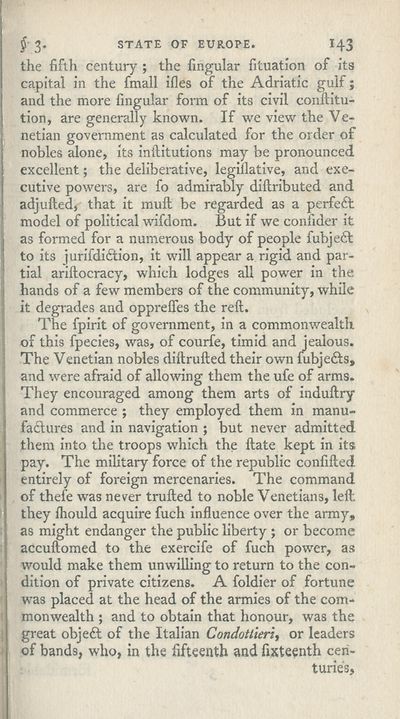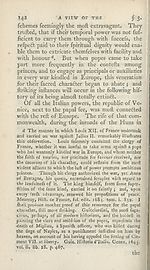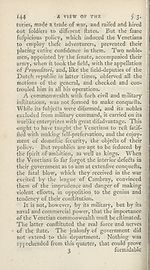Download files
Complete book:
Individual page:
Thumbnail gallery: Grid view | List view

$ 3- STATE OF EUROPE. 143
the fifth century ; the Angular fituation of its
capital in the fmall ifies of the Adriatic gulf;
and the more Angular form of its civil conftitu-
tion, are generally known. If we view the Ve¬
netian government as calculated for the order of
nobles alone, its inllitutions may be pronounced
excellent; the deliberative, legillative, and exe¬
cutive powers, are fo admirably diftributed and
adjufted, that it mull be regarded as a perfeft
model of political wifdom. But if we coniider it
as formed for a numerous body of people fubjedl
to its jurifdidtion, it will appear a rigid and par¬
tial ariftocracy, which lodges all power in the
hands of a few members of the community, while
it degrades and opprelfes the reft.
The fpirit of government, in a commonwealth
of this fpecies, was, of courfe, timid and jealous.
The Venetian nobles diftrufted their own fubjefts,
and were afraid of allowing them the ufe of arms.
They encouraged among them arts of induftry
and commerce ; they employed them in manu¬
factures and in navigation ; but never admitted
them into the troops which the ftate kept in its
pay. The military force of the republic confifted
entirely of foreign mercenaries. The command
of thefe was never trufted to noble Venetians, left,
they ihould acquire fuch influence over the army,
as might endanger the public liberty ; or become
accuftomed to the exercife of fuch power, as
would make them unwilling to return to the con¬
dition of private citizens. A foldier of fortune
was placed at the head of the armies of the com-
t monwealth ; and to obtain that honour, was the
great objeft of the Italian Condotlieri, or leaders
of bands, who, in the fifteenth and fixteenth cen¬
turies,
the fifth century ; the Angular fituation of its
capital in the fmall ifies of the Adriatic gulf;
and the more Angular form of its civil conftitu-
tion, are generally known. If we view the Ve¬
netian government as calculated for the order of
nobles alone, its inllitutions may be pronounced
excellent; the deliberative, legillative, and exe¬
cutive powers, are fo admirably diftributed and
adjufted, that it mull be regarded as a perfeft
model of political wifdom. But if we coniider it
as formed for a numerous body of people fubjedl
to its jurifdidtion, it will appear a rigid and par¬
tial ariftocracy, which lodges all power in the
hands of a few members of the community, while
it degrades and opprelfes the reft.
The fpirit of government, in a commonwealth
of this fpecies, was, of courfe, timid and jealous.
The Venetian nobles diftrufted their own fubjefts,
and were afraid of allowing them the ufe of arms.
They encouraged among them arts of induftry
and commerce ; they employed them in manu¬
factures and in navigation ; but never admitted
them into the troops which the ftate kept in its
pay. The military force of the republic confifted
entirely of foreign mercenaries. The command
of thefe was never trufted to noble Venetians, left,
they ihould acquire fuch influence over the army,
as might endanger the public liberty ; or become
accuftomed to the exercife of fuch power, as
would make them unwilling to return to the con¬
dition of private citizens. A foldier of fortune
was placed at the head of the armies of the com-
t monwealth ; and to obtain that honour, was the
great objeft of the Italian Condotlieri, or leaders
of bands, who, in the fifteenth and fixteenth cen¬
turies,
Set display mode to:
![]() Universal Viewer |
Universal Viewer | ![]() Mirador |
Large image | Transcription
Mirador |
Large image | Transcription
| Antiquarian books of Scotland > Kings & rulers > History of the reign of the Emperor Charles V. > Volume 1 > (161) |
|---|
| Permanent URL | https://digital.nls.uk/109184263 |
|---|
| Description | By William Robertson. London : Cadell and Davies, 1798. |
|---|---|
| Shelfmark | ABS.1.76.13 |
| Additional NLS resources: | |
| Description | Thousands of printed books from the Antiquarian Books of Scotland collection which dates from 1641 to the 1980s. The collection consists of 14,800 books which were published in Scotland or have a Scottish connection, e.g. through the author, printer or owner. Subjects covered include sport, education, diseases, adventure, occupations, Jacobites, politics and religion. Among the 29 languages represented are English, Gaelic, Italian, French, Russian and Swedish. |
|---|

